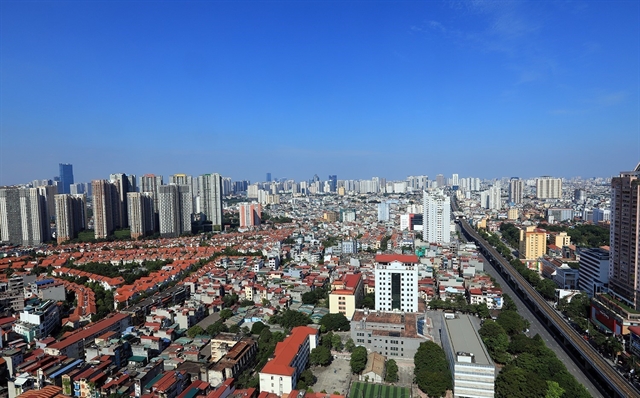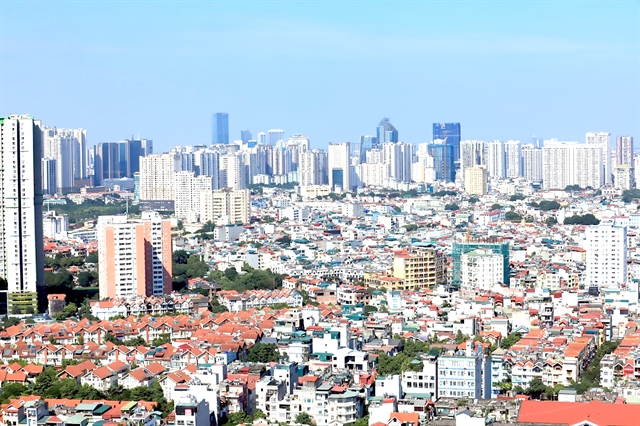 Economy
Economy

 |
| A view of Hà Nội. Việt Nam’s real estate price over the past five year rose by 59 per cent, higher than many developed countries. — VNA/VNS Photo |
HÀ NỘI — Việt Nam's real estate market saw soaring housing costs over the past five years, with high demand driving prices up at a rate higher than that in many developed countries.
Nguyễn Quốc Anh, Deputy General Director of batdongsan.com.vn shared the information at the Việt Nam Real Estate Summit (VRES) 2024 organised by batdongsan.com.vn in Hà Nội.
The expert quoted data from Global Property Guide showing that Việt Nam’s real estate prices over the past five years rose by 59 per cent, higher than the rate in many developed countries such as the US (54 per cent), Australia (49 per cent), Japan (41 per cent) and Singapore (37 per cent).
The high prices have lowered the real estate rental yield in Việt Nam to just 4 per cent, while many other countries – like the Philippines, Malaysia, Thailand, Indonesia, the UK, Australia and the US – are seeing real estate rental yields ranging from 5 per cent to 7 per cent.
Anh stated that economic growth, governance and social demand are the three main factors influencing real estate prices.
In addition to strong per capita economic growth, favourable interest rates and the effectiveness of domestic investment channels have reinforced consumer demand for real estate purchases.
He pointed out that Vietnamese people primarily use main investment channels, such as the financial market, real estate, gold, foreign currencies and savings deposits.
Notably, real estate is considered the best-performing investment channel in the country over the past decade, with apartment returns reaching 197 per cent and land plot profits yielding 137 per cent in the last quarter of 2024 compared to those in the first quarter of 2015.
Meanwhile, the gold market is risky, with a large difference between domestic and world gold prices. Other investment channels, such as foreign currency and savings, have quite low yields at around 9-13 per cent every two years.
According to Anh, Việt Nam's population and urbanisation rate create numerous opportunities for growing real estate demand.
The trend of smaller family sizes is also driving demand for property purchases for the next generation to inherit, along with young people's journey of home ownership.
This means that Việt Nam is among the countries with the highest home ownership rate in the world at 90 per cent, higher than many countries in Southeast Asia – like Singapore (88 per cent) and Indonesia (84 per cent) – as well as others around the world, like the US (66 per cent) and Australia (66 per cent).
At the summit, Bạch Dương, general director of batdongsan.com.vn, said that Việt Nam's real estate market has seen rapid development over the past 30 years.
Before 2009, Việt Nam's real estate market had a favourable legal corridor and macro environment to develop. After joining the WTO in 2007, Việt Nam's FDI in the real estate sector grew rapidly, from $8.5 billion in 2007 to $23.6 billion in 2008 and $21.5 billion in 2009. Many large real estate enterprises were launched with a lot of new projects.
In the period from 2009 to 2012, the decrease in credit and increase in interest rates caused the real estate market to lose liquidity and prices to fall.
Real estate inventory increased from VNĐ108.4 trillion in 2009 to VNĐ192.7 trillion in 2011. At that time, enterprises experienced a rigorous screening process, and many online real estate information channels were created to improve transparency in the property market.
During the growth period from 2013 to 2019, three new laws, including the Land Law, Housing Law and Real Estate Business Law, created positive developments for the real estate market.
The market experienced several changes in 2020 and 2021 due to the COVID-19 pandemic. However, real estate trading activities during these two years continued, with increased supply and prices.
From 2022 until today, the market has faced many challenges due to a difficult macro situation and businesses revealing weaknesses in the financial and legal fields. Consumers demand more of investors and real estate trading floors/brokers.
At present, home buyers still find it difficult to choose real estate products. Investors and brokers also experience challenges in finding customers and building their reputation, Dương said.
2024 marks the 10-year anniversary of the start of VRES. On this milestone, the site has awarded the Việt Nam Real Estate Brokerage Awards (VREAA) for the first time, with seven categories going to 130 excellent brokers nationwide.
The award aims to uphold the prestige and dedication of real estate brokers in Việt Nam, and will help promote a healthy, transparent and sustainable development of the broker market. — VNS




